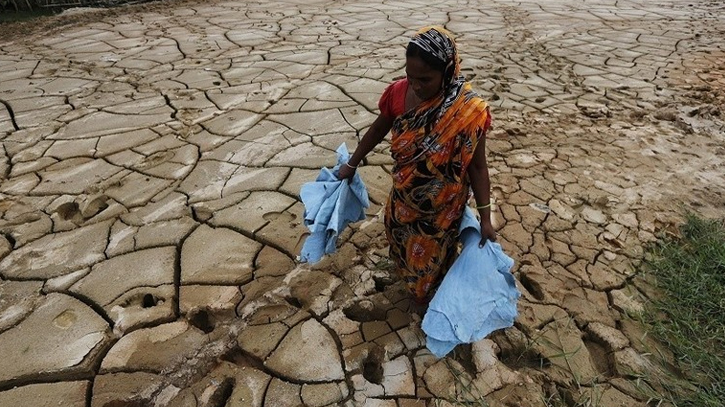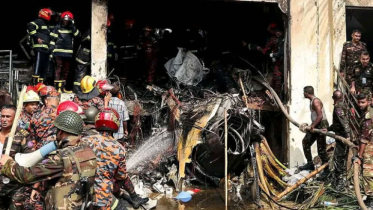
Photo: Collected
Bangladesh is, of course, on the critical list to face the climate crisis. The Global Climate Risk Index 2021 ranks Bangladesh as the seventh most extreme disaster-prone country in the world.
The country, at the confluence of the yawning rivers Padma, Meghna, and the Brahmaputra, creates a delta, with accumulated sand and silt spilling into the Bay of Bengal.
Coastal Bangladesh will always remain prone to natural disasters and annual monsoon river flooding, vulnerable to livelihood.
Thus, the densely populated, low-lying regions are one of the world’s most vulnerable countries to disasters and climate change. Every year, an estimated 3.5 million people in Bangladesh are at risk of river flooding due to rising sea levels and increasingly intense monsoons.
The vulnerability of Bangladesh to climate risks has brought into focus the delicate balance between its pursuit of the Sustainable Development Goals (SDGs) and the multifaceted impacts of global warming.
The SDGs and their determined achievement in several categories of goals will be severely dented due to climate risk and global warming.
Often argued by planners and policymakers that the Arctic is thousands of miles away from Bangladesh, melting polar ice caps may not harm the region much, as predicted by climate scientists for the last few decades.
While the immediate repercussions are visible in the Polar regions, the Arctic is experiencing unprecedented warming, losing its sea ice and snow cover at an alarming rate, several research stations have found.
Dr. Hossain Zillur Rahman, a leading development economist, said that the dramatic achievements in human development and infrastructure development may cause irreparable damage to the glorious economic triumphs.
The melting Greenland Ice Sheet in the Arctic, Bangladesh's deltaic nation will have vast stretches of land barely above sea level, which impacts sea level rise, heightening risks of coastal inundation, salinity intrusion, and land loss, writes The Arctic Risk Platform.
Professor Ainun Nishat, a water resource and climate change specialist and a professor emeritus at BRAC University, said that the implications would be profound during climatic extremes.
From displacing millions to threatening food and water security, the Arctic’s warming disrupts the monsoon systems, and Bangladesh would grapple with erratic rainfall patterns, leading to extended droughts and devastating floods, he remarked.
Dr Rahman, a policymaker who led the team to develop the poverty reduction strategy of the government, said the SDGs serve as a beacon for Bangladesh’s developmental aspirations; they are deeply intertwined with the nation’s socioeconomic fabric.
He said the infrastructure, which forms the backbone of developmental ambitions, is likely to face vulnerabilities due to climate-induced damages, potentially isolating communities and hindering economic progress.
Bangladesh’s determination to march towards the SDGs is rendered more intricate by the indirect yet profound influences of Arctic warming, including the accelerated melting of the Greenland Ice Sheet, which significantly contributes to rising sea levels, posing an even greater challenge to the nation’s development.
Extensive research on socioeconomic implications needs to be undertaken to understand the impact on Bangladesh’s SDG journey and the impact of climate risk, said Dr Rahman, the founder of a research institute, Power Participation and Research Centre.
He describes how critical infrastructures, including roads, schools, and health facilities, are threatened by the rising waters and intensified weather extremes.
Presently, 90 per cent of Bangladesh’s electricity grid is at risk from strong cyclonic winds exceeding 30 meters per second.
Looking ahead to 2050, over 65 per cent of electricity substations and 67 per cent of power plants could face potential climate-related hazards. Due to climate change, the road and rail network in Bangladesh will bear the brunt of climate change.
These may include more frequent flooding and erosion, greater wear and tear from extreme weather, increased obstructions from debris after cyclones and storm surges, and salinity impacts in coastal areas, said Professor Nishat.
Agriculture is a vital lifeline for a substantial portion of Bangladesh’s population, but it faces increasing threats from unpredictable weather and rising salinity levels.
In Bangladesh, 70 per cent of the land is allocated to agriculture, employing 48 per cent of the population.
Climate-related events not only impact food security but also place significant strain on livelihoods, casting doubts on the nation’s progress toward achieving SDG targets of ‘no poverty’ and ‘zero hunger.’
Current estimates indicate that only in the agricultural sector in Bangladesh may incur an annual loss of approximately USD 7.7 billion (BDT 84,588.27 crore) due to climate change.
Within two decades, the country’s average annual rice production could decline by 33 percent due to climate vulnerability, according to Global Climate Risks, a research outfit based in the United Kingdom.
Agriculture has a central role in Bangladesh’s economy and will face challenges originating from erratic monsoons, extreme weather events, and salinity intrusion, affecting both food security and countless livelihoods, said Prof. Nishat.
In Bangladesh, repeated climatic shocks are hindering access to education, health, and opportunities, and posing significant barriers to SDGs related to health, education, and well-being.
The nation’s human capital, its most valuable asset, confronts threats from climate change that, when amplified by Arctic warming, can potentially erode its developmental milestones.
A growing number of Bangladeshi children have had to permanently end their education when they migrate to urban slums in the wake of climate disasters. Around 1.7 million children in Bangladesh are laborers, and one in four of them is 11 years old or younger, according to UNICEF.
Bangladesh’s pursuit of the SDGs is frankly linked with the distant echoes of the Arctic’s warming, cautions Dr. Rahman.
It’s crucial for Bangladesh policymakers and politicians to adopt strategies accordingly to face the daunting challenges supposedly caused by climate extremes.
Bangladesh certainly can still develop strategies and plan for a harmonious balance between sustainable growth and the ever-shifting climate landscape, observed Global Climate Risks.
Messenger/Disha








